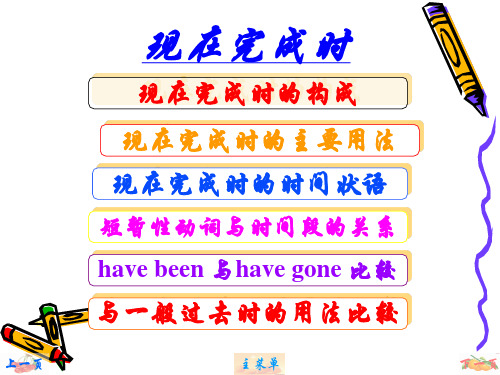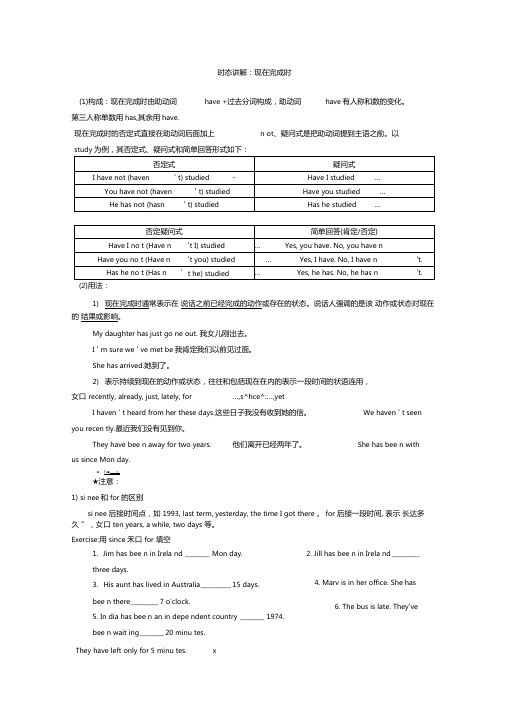新东方面试现在完成时讲解
(完整版)现在完成时讲解

I have had this watch for five years / since 5 years ago.
2.这位老人已经死了十年了。
WThe old man has died for ten years.
The old man has been dead for ten years/since 10 years ago.
I have learnt English for more than ten years.我已经学了10多年的英语。
(从10年前开始,持续到现在还在学)
上一页
She has swum since half an hour ago. 我已经游泳了半个小时
(半个小时前已经开始游泳,到现在还在游)
主菜单
于助动词或系动词后,实义动词前。 • never用于句中,助动词或系动词后,实
义动词前,表示否定意义。
• He has ever been to Paris.
• He has never been to Paris.
3) just表示“刚刚”(用于完成时态时,与already, never 等副词的位置一样,多用在助动词have/has和 动词过去分词之间)
He has been here for three days.
He has been here since yesterday.
He has been here since two days ago / last Monday.
He has been here since his wife died.
Since he was a child ,he has lived in England.
(完整版)现在完成时讲解及练习

(完整版)现在完成时讲解及练习Unit 9:现在完成时讲解一.基本结构:助动词have/has+过去分词(done)二.句型:否定句:主语+have/has+not+过去分词+其他.一般疑问句:Have/Has+主语+过去分词+其他.简略答语: Yes, 主语+ have/has.(肯定)No, 主语+ haven't/hasn't.(否定)三.用法(1)现在完成时表示过去发生或已经完成的动作对现在造成的影响或结果I have spent all of my money (so far).(含义是:现在我没有钱花了.)Guo zijun has (just/already) come. (含义:郭子君现在在这儿) My father has gone to work.(含义是:我爸爸现在不在这儿)(2)现在完成时可以用来表示发生在过去某一时刻的,持续到现在的动作(用行为动词表示)或状态(be动词表示)常与for(+时间段),since(+时间点或过去时的句子)连用.①for+时段②since+过去一个时间点(译为:自从……以来)③since+时段+ago④since+从句(过去时)●⑤It is+时段+since+从句(过去时)Mary has been ill for three days.I have lived here since 1998.四.has gone (to),has been (to), has been (in) 的区别Have/Has gone(to) :去了(现在不在说话现场)Where is your father?He has gone to Shanghai.Have/Has been (to) :去过(已不在去过的地方)My father has been to Shanghai.Have/has been in:呆了多久(还在所呆的地方)My father has been in Shanghai for two months. /sin ce two months ago.五.现在完成时的标志1. 现在完成时的含义之一是过去完成的动作对现在仍有影响,用以下四大标志词可以表达这种含义:* 以already, just和yet为标志He has already got her help. 他已得到她的帮助。
现在完成时讲解及考点归纳

现在完成时解析(Present perfect continuous tense)一、现在完成时的构成(一)肯定式主语+助动词have /has +过去分词+其它说明:这里的have /has是助动词,没有什么具体意义。
当主语是第三人称单数时助动词用has,其余人称一律用have。
has,have的缩略式分别为's或've。
规则动词过去分词的构成与过去式的构成方式一样,不规则动词可参看不规则动词表。
实例:(二)否定式主语+助动词have /has+not+过去分词+其它说明:现在完成时构成否定句时,只需在助动词have /has后面加not就行。
have not,has not的缩略式分别为haven't ,hasn't。
另外,肯定句中有some,already时,改为否定时要分别改成any,yet。
实例:注:有时not可以用never代替,表示“从来没有”的意思。
又如:I have never seen him before.以前我从来没有见过他。
(三)一般疑问式助动词Have /Has +主语+过去分词+其它?说明:把陈述句中的have或has放到句首,句末打问号,同时把句中的some ,already 改为any ,ye t就构成了一般疑问句。
肯定回答用“Yes ,主语+have/has. 否定回答用“No,主语+haven't/hasn't.”有时也可以用“No,not yet./No ,never./No,not even once.”等。
实例:注意:当句中有否定词not ,hardly(几乎不),never的时候,在改为反意疑问句时,附加部分用肯定形式。
例如:You have never come to our school ,have you ?你以前从来没有来过我们学校,是吗?二、现在完成时的用法(一)现在完成时的用法一).表示过去发生或已经完成的某一动作对现在造成的影响或结果。
(完整版)现在完成时讲解及练习题及答案

(完整版)现在完成时讲解及练习题及答案时态讲解:现在完成时(1)构成:现在完成时由助动词have + 过去分词构成,助动词have 有⼈称和数的变化。
第三⼈称单数⽤has,其余⽤have.现在完成时的否定式直接在助动词后⾯加上not、疑问式是把助动词提到主语之前。
以study 为例,其否定式、疑问式和简单回答形式如下:(2)⽤法:1)现在完成时通常表⽰在说话之前已经完成的动作或存在的状态。
说话⼈强调的是该动作或状态对现在的结果或影响。
My daughter has just gone out. 我⼥⼉刚出去。
I’m sure we’ve met before. 我肯定我们以前见过⾯。
She has arrived. 她到了。
2)表⽰持续到现在的动作或状态,往往和包括现在在内的表⽰⼀段时间的状语连⽤,如recently, already, just, lately, for…, since…,yet等。
如:I haven’t heard from her these days. 这些⽇⼦我没有收到她的信。
We haven’t seen you recently. 最近我们没有见到你。
They have been away for two years. 他们离开已经两年了。
She has been with us since Monday.★注意:1)since和for的区别since后接时间点,如1993,last term, yesterday, the time I got therefor后接⼀段时间,表⽰“长达多久”,如ten years, a while, two days等。
Exercise: ⽤since和for填空1. Jim has been in Ireland ______ Monday.2. Jill has been in Ireland ______ three days.3. His aunt has lived in Australia ______15 days.4. Mary is in her office. She has been there ______ 7 o'clock.5. India has been an independent country ______1974.6. The bus is late. They've been waiting ______ 20 minutes.7. Nobody lives in those houses. They have been empty ______ many years.8. Mike has been ill ______a long time. He has been in hospital ______ October.2)表⽰短暂意义的动词如arrive, leave, borrow, buy, begin, start, die等,在完成时当中不能和表⽰⼀段时间的状语连⽤,因为它们表⽰的动作不可能持续。
现在完成时精讲以及练习(附答案)

现在完成时精讲和练习(附答案)一、现在完成时的六种常用情景:(一)表示过去发生或已经完成的动作对现在造成的影响或结果,1、The car has arrived。
车子来了。
(对现在结果的影响是:车子已在门口)2、Someone has broken the window.有人把窗户打破了。
(对现在结果的影响是:窗户仍破着)3、It’s so dark。
Someone has turned off the light.这里很黑,有人刚把灯关了。
(对现在结果的影响是:现在很黑)4、Are you free? I have finished my homework. I am free.你有空吗?我已经做完了家庭作业。
我有空。
(我已经完成了家庭作业,对现在影响是:很有空)。
(二)表示过去已经开始,一直延续到现在的动作或状态。
一般会和表示从过去某一时刻延续到现在(包括“现在”在内)的一段时间的状语连用。
如for+时间段、since+过去的时间点、疑问词how long等。
这时表示持续动作或状态的动词必须是延续性动词。
1、My uncle has worked at this factory for five years。
我叔叔在这个工厂工作已经五年了。
2、Mr. Black has lived in China since 2002。
自从2002年Mr. Black 一直住在中国。
3、How long have you been here?你来这里多久了?4、I have learnt English for more than ten years。
我已经学了10多年的英语。
(从10年前开始,持续到现在)5、She has swum since half an hour ago。
我已经游泳了半个小时。
(半个小时前开始,到现在还在游) (三)经验性用法:表示从过去开始到目前为止这段时间中反复发生的动作或多次出现的状态。
新东方-初中英语面试试讲(现在完成时)

今日课堂主题:现在完成时时态介绍Part 1现在完成时(The present perfect tense)从过去某一时间发生到现在或将持续下去的动作;强调过去发生的事情对现在造成的影响;已经完成的动作。
1、他在这儿工作十年了。
(还可能继续在这儿工作)2、我刚刚已经吃过饭了。
(已经完成了吃饭这个动作,现在已经不饿了)eg: He has worked here for ten years.I just have had my lunch.陈述句:主语+have/has done+其他.否定式:主语+have/has not done+其它.疑问句:Have/Has+主语+done+其它?Yes,主语+have/has. No,主语+have/has not.1、她已经做完了她的家庭作业。
2、我见过他两次。
She has done her homework.She has not done her homework. (has not=hasn’t) Has she done her homework?Yes,she has. No,she has notI have seen him twice.I have not seen him twice.(have not =haven’t) Have you seen him twice ?Yes,I have. No,I have not时态用法1231He has been away from the city.他已离开这个城市。
(结果:他不在这个城市。
)I have lost my pen.我把钢笔丢了。
(结果:我现在无钢笔用。
)动作发生在过去某个不确定的时间完成了,而且对现在造成了影响或结果He has finished his work.他把工作做完了。
(结果:他可以做其他的事了。
)Part 3时态用法1232He has lived here 自从1978年以来,他一直住在这儿I have been in the army years.我在部队已经呆了五年多了表示过去某一时间到现在这段时间内重复持续性动作,未来可能还将继续。
现在完成时的用法讲解教学文案

现在完成时的用法讲解现在完成时的讲解对所学时态的回顾,引入现在完成时通过数轴来概括讲解所学的四个时态:一般现在时、现在进行时、一般过去时、一般将来时。
(导入)有时候,这4种时态还不能满足我们表达的需要。
比如:表示“某人过去曾经做过某事”或者“某人做某事多久”,以上五种时态就派不上用场了。
这时,我们可以用一种新的时态——现在完成时表示。
同样也用数轴来表示一下。
一现在完成时的构成:主语 + have/has + 过去分词(过去分词:规则动词的过去分词构成与动词过去式相同;不规则动词需要特殊记忆。
eg .I have taught English in this school since 1999.二、否定式:主语 + haven’t/hasn’t + 过去分词。
疑问式: Have /Has + 主语 + 过去分词?简略答语: Yes, 主语 + have/has.(肯定)No, 主语 + haven’t/hasn’t.(否定)—Have you finished your work? — Yes,I have.三现在完成时的含义之一表示过去发生或已经完成的动作对现在造成的影响或结果,常与already/yet,just,never/ever,before, so far等连用。
这些标志词可以表达这种含义. 1.already意为“已经”,通常用于肯定句中,可放在助动词之后,过去分词之前,也可以放在句末。
实例:1)I've already read this book. 我已经读过这本书了。
(“读”这一动作发生在过去,对现在造成的影响是“知道书中的内容”。
)2)I've washed my clothes already.我已经洗了衣服。
(洗衣服的动作已完成,其结果是“衣服冼干净了”。
)注意:在表示吃惊或明知故问等感情色彩时,already也可用于(口语)疑问句中。
实例:3)Have you met him already ?你(真的)已经见过他了?2.yet用在疑问句中意为“已经”,用在否定句中意为“还”,常放在句末。
现在完成时讲解及练习题含答案

时态讲解:现在完成时(1)构成:现在完成时由助动词have +过去分词构成,助动词have有人称和数的变化。
第三人称单数用has,其余用have.现在完成时的否定式直接在助动词后面加上n ot、疑问式是把助动词提到主语之前。
以study为例,其否定式、疑问式和简单回答形式如下:(2)用法:1)现在完成时通常表示在说话之前已经完成的动作或存在的状态。
说话人强调的是该动作或状态对现在的结果或影响。
My daughter has just go ne out. 我女儿刚出去。
I ' m sure we ' ve met be我肯定我们以前见过面。
She has arrived.她到了。
2)表示持续到现在的动作或状态,往往和包括现在在内的表示一段时间的状语连用,女口recently, already, just, lately, for …,s^hce^:…,yetI haven ' t heard from her these days.这些日子我没有收到她的信。
We haven ' t seen you recen tly.最近我们没有见到你。
They have bee n away for two years. 他们离开已经两年了。
She has bee n withus since Mon day.A 、八■,、、》;★注意:1) si nee和for的区别si nee 后接时间点,如1993, last term, yesterday, the time I got there 。
for 后接一段时间, 表示长达多久”,女口ten years, a while, two days 等。
Exercise:用since 禾口for 填空1.Jim has bee n in Irela nd ________ Mon day.three days.3.His aunt has lived in Australia __________ 15 days.bee n there _________ 7 o'clock.5. In dia has bee n an in depe ndent country ________ 1974. bee n wait ing ________ 20 minu tes. 2. Jill has bee n in Irela nd _________ 4. Mary is in her office. She has6. The bus is late. They'veThey have left only for 5 minu tes. x7.Nobody lives in those houses. They have bee n empty ___________ m any years. 8. Mikehas bee n ill ________ a long time. He has bee n in hospital ___________ O ctober.2)表示短暂意义的动词如arrive, leave, borrow, buy, begin, start, die等,在完成时当中不能和表示一段时间的状语连用,因为它们表示的动作不可能持续。
- 1、下载文档前请自行甄别文档内容的完整性,平台不提供额外的编辑、内容补充、找答案等附加服务。
- 2、"仅部分预览"的文档,不可在线预览部分如存在完整性等问题,可反馈申请退款(可完整预览的文档不适用该条件!)。
- 3、如文档侵犯您的权益,请联系客服反馈,我们会尽快为您处理(人工客服工作时间:9:00-18:30)。
现在完成时:
Have you ever(曾经) watched basketball on TV?
I have been a basketball fan since(自从) I was little
I have heard a lot about him. He is really great!
I have lived in Bei Jing for 10 years.
现在完成时的用法一:主语+have/has done, 表示从过某一时间一直持续到现在的动作或者状态,且将 来仍有可发生。
时间状语: 常与since + 过去的时间点,for + 一段时间等表示一段时 间的状语连用。
现在完成时的用法一:主语+have/has done. 常与since + 过去的时间点,for + 一段时间等表示一段 时间的状语连用。
时态-现在完成时(2)
一、Why do we learn the present perfect tense?(1)
Have you ever(曾经) watched basketball on TV?
No, never(从未), what about you?
Yes, I watched basketball a lot.
现在完成时态
主语+have+动 词的过去分词
I have been a basketball fan since(自从) I was little
现在完成时
past
present(now) future
二、What is the difference in the meanings between these two tense?
一般过去时:
现在完成时:
In fact, I watched the L.A. Lakers play yesterday.
一般过去时
yesterday
present(now) future
二、What is the difference in the meanings between these two tense?
现在完成时态
主语+have/has done
一、Why do we learn the present perfect tense?(1) 提升表达的多样性,准确性。
一、Why do we learn the present perfect tense?(2)
考点
现在 完成 时态
要求 掌握
2010
C. has worked D. is working
一、Why do we learn the present perfect tense?(2) 提高做题的准确率和速度,提升跻身名校的几率
二、What is the difference in the meanings between these two tense?
一般过去时
主语+动词的 过去式(did)
Have you ever(曾经) watched basketball on TV?
I have been a basketball fan since(自从) I was little
I have heard a lot about him. He is really great!
for +一段时间
tudied English for 3 years.
Oh, I see. By the way, who is your favorite player?
他们赢了吗?
必须的啊,我老开心了,你 不知道,从我小时候开始, 我就喜欢打篮球。
哦,这样啊,对了,那你喜 欢哪个球员啊?
Kobe Bryant, of course.
I have heard a lot about him. He is really great!
一般过去时:过去一个时间发生的单一事件,代表在讲话时 就已经发生过的事
现在完成时的用法二:主语+have/has done, 表示从过某一时间一直持续到现在的动作或者状态,且将 来仍有可发生。
辨析
i have lived in BJ for 10 years.
I lived in Bei Jing for 10 years.
32题 1分
北京市5年中考统计 2011 2012 2013
31题 1分
32题 1分
32题 1分
2014
32题 1分
题型
完形 填空
中考 预测
☆☆ ☆
(2014,北京) 32. He _____ in this factory for 20 years already.
A. will work
B. works
In fact, I watched the L.A. Lakers play yesterday.
你在电视上看过篮球比赛吗?
没有,从来没看过。你呢?
哎呦,我看超多的哦。 实际上,我昨天刚看了湖人 的比赛。
Did they win?
Yes, of course. I was so happy. I have been a basketball fan since(自从) I was little
since+过去的时间点 I have been here since 2000.(单词) I have been here since 5 years ago.(词组) I have been here since I graduated in 2000. (从句<过去时态>)
现在完成时的用法一:主语+have/has done. 常与since + 过去的时间点,for + 一段时间等表示一段 时间的状语连用。
Yeah, I agree.
当然是科比,布莱恩特了。
我听说过很多关于他的消息 呢,他真的很棒!
嗯,我同意。
Yes, I watched basketball a lot.
In fact, I watched the L.A. Lakers play yesterday.
Yes, of course. I was so happy.
